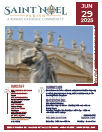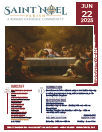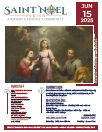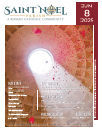Weekend Liturgies
Saturday: 5 p.m.
Sunday: 9 a.m. & 11 a.m.
Weekday Liturgies
Monday: 8:30 a.m.
Tuesday: 8:30 a.m.
Wednesday: 8:30 a.m.
Thursday: No Daily Mass
Friday: 8:30 a.m.
Eucharistic Adoration
Monday: 9 a.m. – 6 p.m.
Reconciliation
Saturday: 3:30 – 4:30 p.m.
Holidays and Feast Days
Holy Days of Obligation: 7 p.m. (Vigil), 8:30 a.m.
Civic Holidays: 9 a.m.
Christmas Eve: 4:30 p.m., 7:00 p.m., 10:00 p.m.
Christmas Day: 11:00 a.m.
![]() LINKS
LINKS
 Facebook
Facebook
Follow our social media posts including
videos, photos, and faith formation groups
 Formed
Formed
Watch videos, listen to audio, and read
e-books all available on demand for free
 Ministry Scheduler
Ministry Scheduler
Log in to view your schedule,
edit availability, or request substitutes

Endowment Fund
Donate online to support current parish
ministries and to secure the future of the parish
Saint Noel Church • 35200 Chardon Road, Willoughby Hills, OH 44094 • 440-946-0887



















